Lecture 2: Trade, WTO and Regional trade agreements
1/53
There's no tags or description
Looks like no tags are added yet.
Name | Mastery | Learn | Test | Matching | Spaced | Call with Kai |
|---|
No analytics yet
Send a link to your students to track their progress
54 Terms
the puzzle of trade policy
almost all economists agree that free trade is welfare enhancing
We can make ourselves richer (on whole)
All we have to do is eliminated barriers to trade
They whey does trade protection persist?
American car export to EU example
At the border, the EU will charge you 10% on the price of
the car = tariffYou need to prove that the vehicle meets EU CO2
emission standards (different from US standards)Meet EU airbag standards (US
airbags are broader because people don't wear seatbelts) = non-tariff barriers
types of trade protection
tariffs
Quotas
Non-tariff barriers
types of trade protection: tariffs
a tax on imported goods
Types of trade protection: quotas
a limit on the amount of goods that can be imported by a nation or globally (rare today bc WTO doesn’t allow quotas)
Types of trade protection: non-tariff barriers
everything else
Industry subsides
Consumer and environmental safety standards
Industry insurance programs
Laws to protect regional products
Industry lobbies and law makers can get very creative
*industries can get creative on how to protect itself
Why are there still so many barriers to trade?
1. Economically, free trade can be a prisoner's dilemma, and countries have economic incentives to protect without coordination
→ All countries could be better off from coordinated liberalization
2. Other, non-economic concerns, especially for non-tariff barriers:
Consumer safety
Environmental protection
National Security Concerns
→ Not clear that liberalizing these would enhance welfare
1.An economic prisoners dilemma
It Takes Two to Trade:
Few governments liberalize unilaterally.
Gains from trade are only guaranteed if other states also liberalize:
'If you liberalize and another state doesn't, comparative advantage might not be realized and one state may be worse off
Some states may be better off imposing a tariff if liberalization is not reciprocated.
(Or at least politicians can be better off by catering to domestic interests.)
While trade is jointly beneficial, sometimes it is more beneficial to exploit others' open markets while you keep your market closed
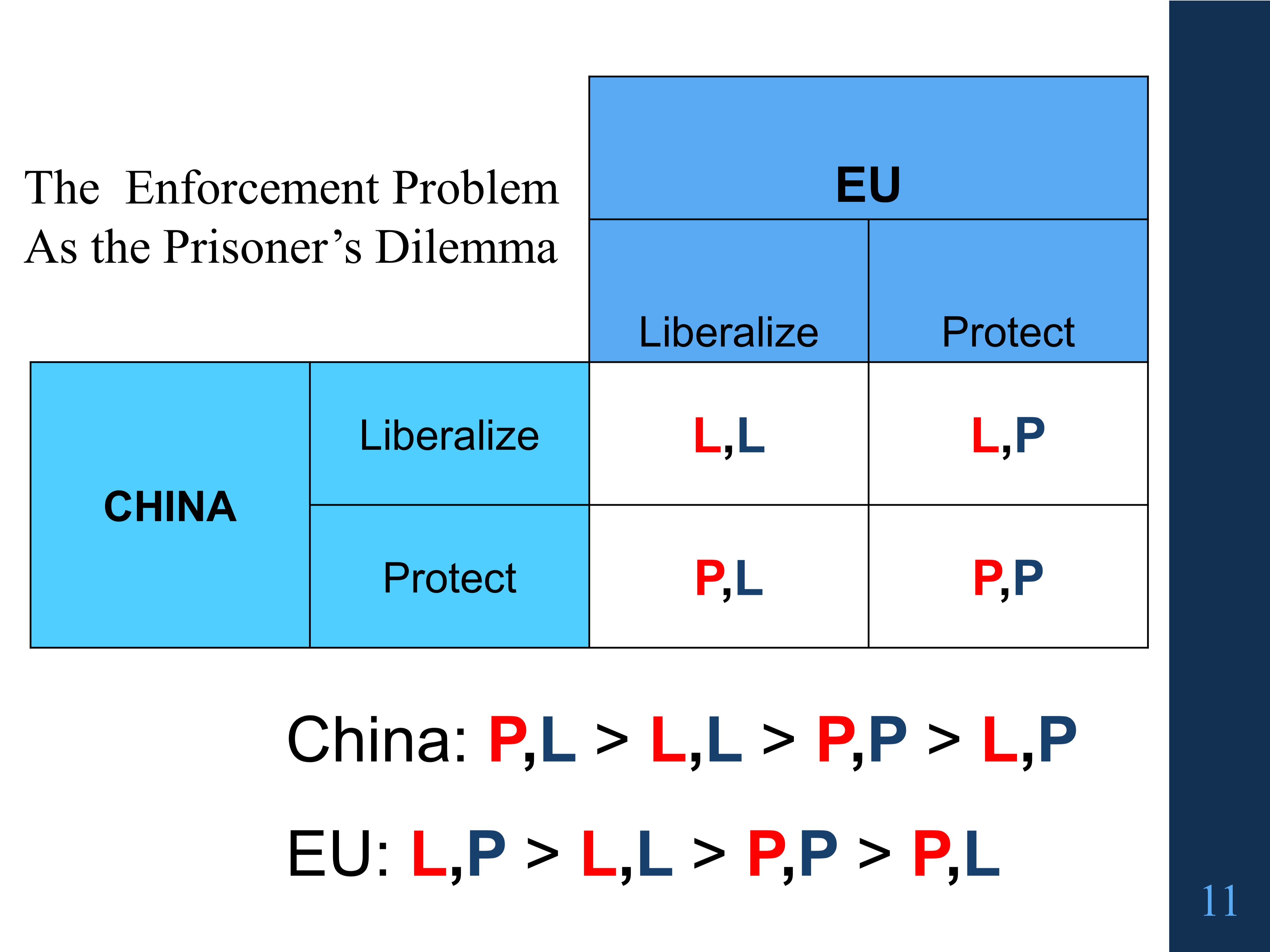
Nash equilibrium
neither country can unilaterally make themselves better of
Prisoner dilemma ex.
LL: China could make itself better off by protecting —> incentive to defect
PP: neither by themselves can make themselves better off unilaterally
Prisoners dilemma
Collectively, they both would do better by staying silent
Yet, each has an incentive to rat out his accomplice
Defection is the best response whether the accomplice stays quiet or defects = "dominant strategy"
No matter what the other does, you want to talk—> dominate strategy
Always better off if you defect
Both defect, although they would be much better off if they both stayed silent
Cooperation made easier through bargaining and institutions
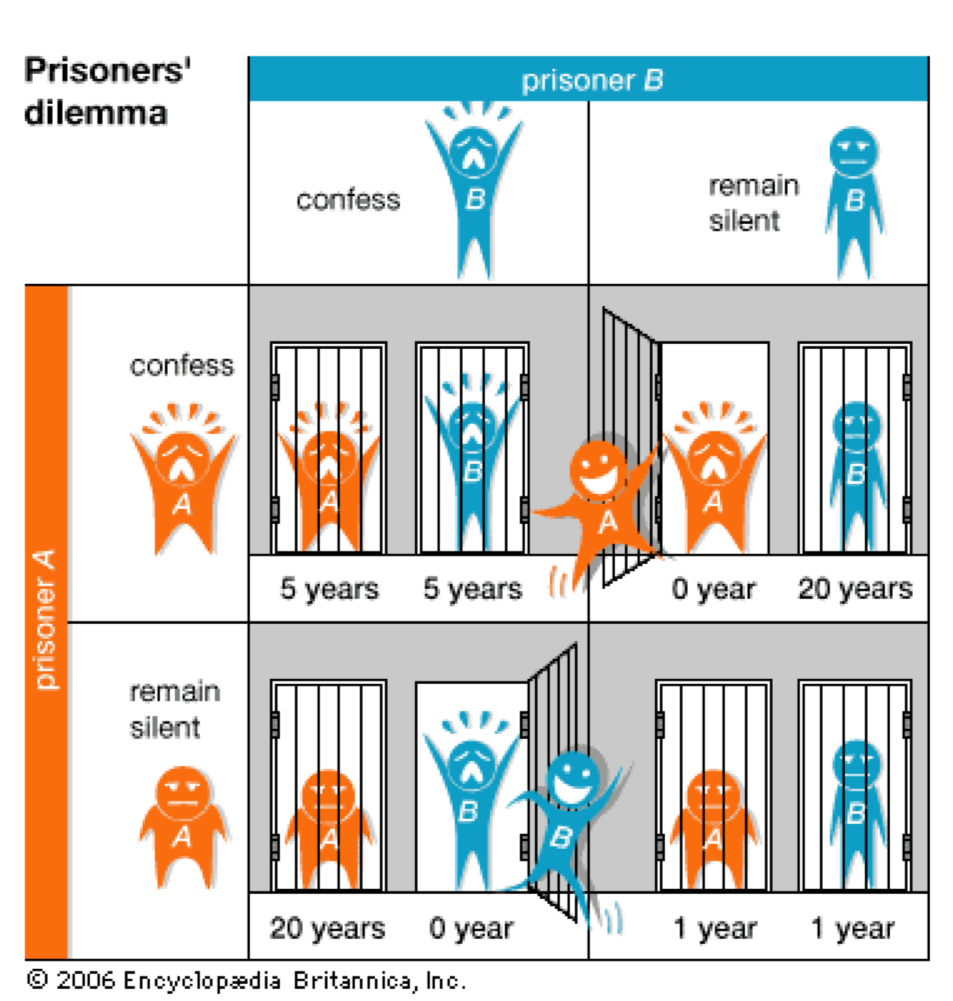
To get to cooperation, countries need to bargain
Because states won't liberalize unilaterally, they instead seek liberalization through formalized agreements.
However, this brings new problems.Sometime states can disagree over the distribution of trade's benefits and want to make sure they're not getting the "worst deal ever signed, ever!"
Two questions in bargaining
Can an agreement be reached at all?
Where does it fall?
What prevents a successful bargaining?
No mutually beneficial gains to be made:
status quo is already at one country's policy ideal point how things are —> one country is already happy with how things are
Preferences incompatible (can be the case for non-tariff barriers, think of airbags and seatbelts!)
Information problems:
Countries don't know others' ideal points, level of resolve or patience —> Everyone has incentive to defect
Incentive to misrepresent
Inability to credibly commit to the agreement Implementation mistrust
Outside options
where does it fall? Bargaining power
An agreement will fall somewhere along the "contract curve", i.e. the set of "efficient" agreements acceptable to all parties.
A state's bargaining power plays a role in where along the curve it lands
More power = more close to your ideal point
Not all about providing a public good
States still want to maximize benefits (either economic or political)
E.g. EU/US agricultural markets are heavily protected, yet we can sell our manufactured goods almost anywhere.
step 1: cooperation and bargaining
Further away from 0 = more protectionist
SQ = status quo
US/EU liberalizing their agriculture moves them further from their ideal point —> wont do this without getting something back
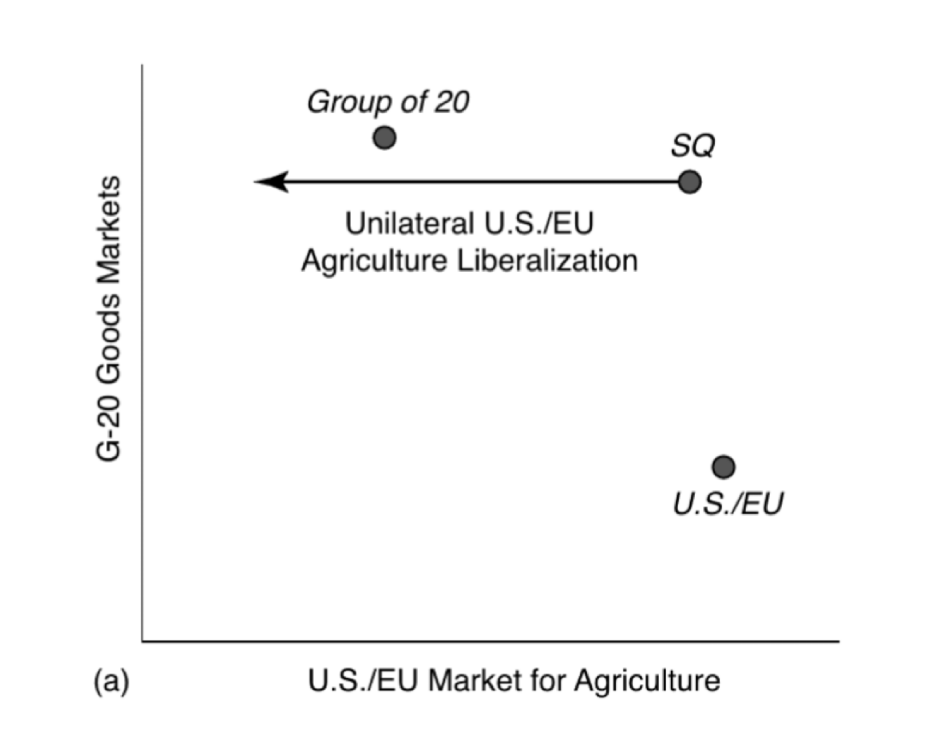
Step 2: cooperation and bargaining
Points along circle: just as happy with any point than SQ
Overlap: joint gains
Where is it effecticent for the agreement to fall?
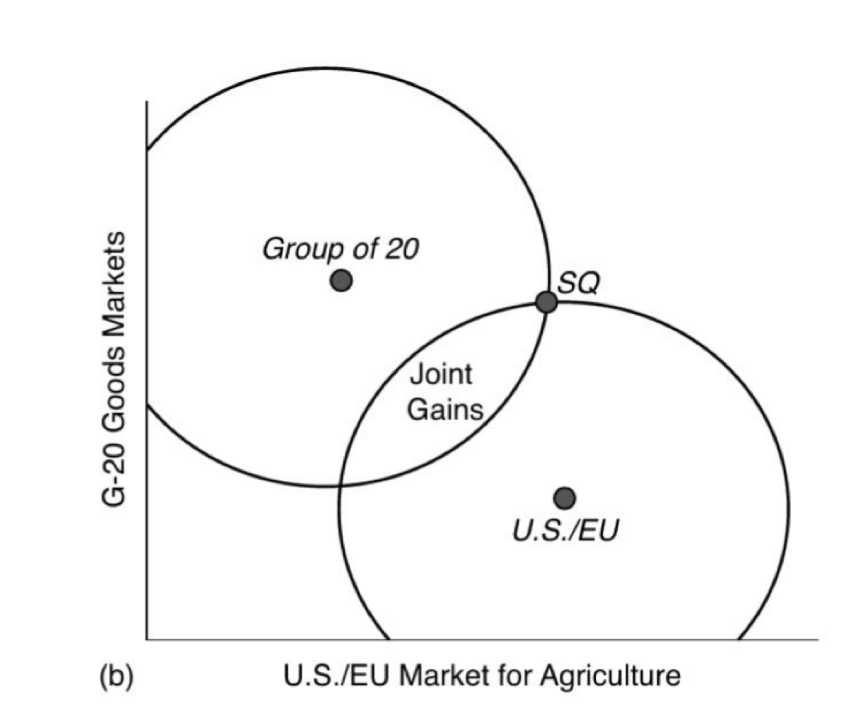
Step 3: cooperation and bargaining
Efficient agreement is anywhere where the circles meet
Efficiency: can now not make one country better off without making the other worse off
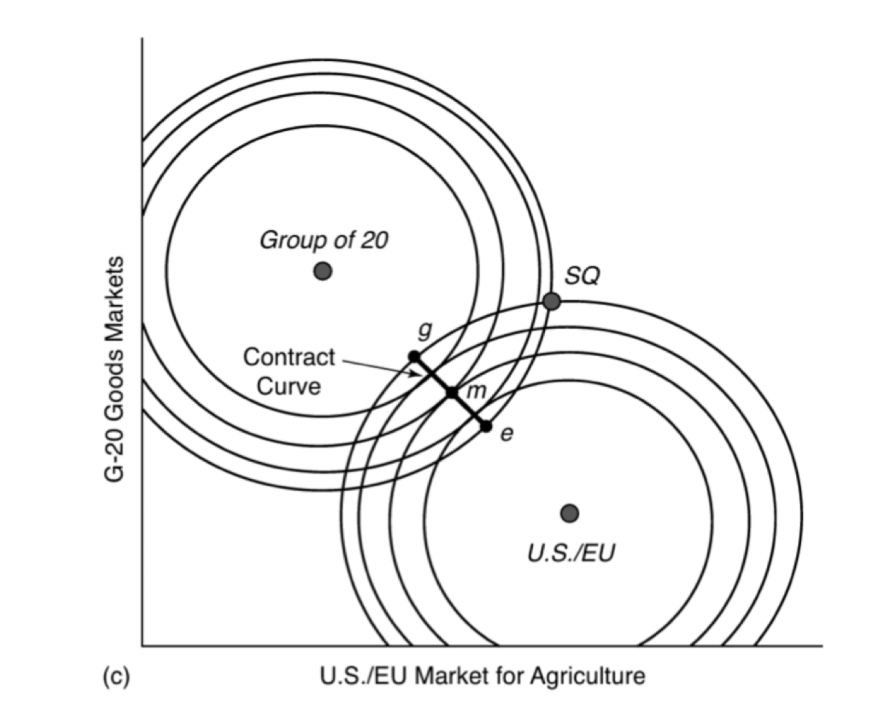
Step 4: cooperation and bargaining
Bargaining power: who can pull the agreement closer to their preferred point —> tends to go to point E bc they are bigger and have more power
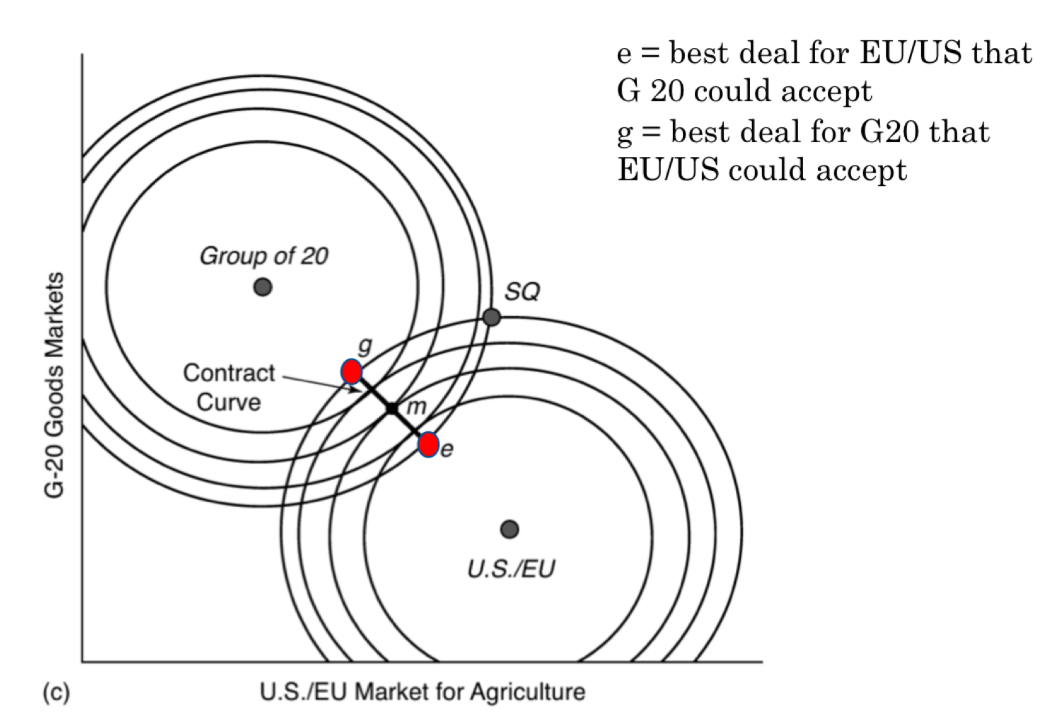
Bargaining power: Determinants
Market size/trade volume:
States that have a strong interest in EU markets may accept more demands from the EU than states that gain less from EU markets
Patience:
Are you willing to walk away from a deal and wait for the next negotiation round?
Attractiveness of Outside Options:
No, Britain cannot replace trade with the EU with trade with other countries
How can we resolve these barriers? Facilitating cooperation
Several Factors make cooperation and bargaining easier:
Small # of states, or one hegemon to back the system
Information to monitor compliance
Repeated interaction (tit for tat)
Ability to punish defectors
Reciprocity
Incorporate long-term gains into decision making
Linkage of policies Issue linkage
Tie compliance to other issues like security
Won’t defect on trade agreements bc they need them for other things too and if they do they might not have access to these things anymore
International institutions (WTO or RTAs) can help with some of these...
How can we resolve these barriers? International institutions
Provide mechanisms to aid trade cooperation
Set standards of behavior
Monitor and enforce compliance
Reduce transaction costs
Often based upon the principle of reciprocity (iteration and tit for tat)
Concessions granted by one state are matched by others
Can take many forms
Global Organisations (WTO)
Regional Organisations (NAFTA, CARICOM, MERCOSUR, EU CU)
Bilateral
GATT
General Agreement on Tariffs and Trade (GATT), 1948-1994
23 members by 1948
Created with other Bretton Woods institutions (IMF, World Bank)
Lasts until 1994, replaced by the WTO
WTO
World Trade Organization (WTO), 1994 - today
Includes Updated General Agreement on Tariffs and Trade (GATT)
Uruguay Round Added Agreements on New Areas (Services, Non-Tariff Barriers, Intellectual Property Rights...)
Still, can't agree on trade on agricultural and other goods protected by strong interest groups in Western world.
3 elements of WTO
Established common principles and rules
Repeated intergovernmental bargaining process
Dispute settlement mechanism
WTO: common principles and rules
Market liberalism - more trade is better
Nondiscrimination:
Most favored nation
National treatment
WTO: most favored nation (MFN)
All countries are treated as the closest trading partner
Article 1: If you liberalize trade for one country, you have to liberalize it for all WTO members
WTO: national treatment
Behind the border, foreign goods have to be treated the same as domestic goods
Article 3: Prohibits regulations and other policies that give domestic firms an unfair advantage
WTO: exceptions to MFN
Regional trade arrangements
Free-Trade Area (e.g., NAFTA)
or Customs Union (e.g., EU)
Generalized System of Preferences (from 1960s):
Developed countries can apply lower tariffs for developing countries than for their peers
Tool to encourage development
WTO: General exceptions
Deviate from rules if necessary from certain things
necessary to protect public morals;
necessary to protect human, animal or plant life or health;
relating to the importations or exportations of gold or silver
imposed for the protection of national treasures of artistic, historic or archaeological value;
relating to the conservation of exhaustible natural resources if such measures are made effective in conjunction with restrictions on domestic production or consumption;
Legal or illegal: the netherlands lowers tariffs on cheese imports from Switzerland, but not from America
illegal —> violates MFN
Legal or illegal: the Netherlands lowers tariffs on cheese imports from Switzerland as part of a free trade agreement with Switzerland, but not from America
legal —> exemption of free trade agreements
Legal or illegal: the Netherlands mandates that all American cheese has to be stacked on the bottom shelves at supermarkets
Illegal —> violates national treatment
intergovernmental bargaining process
Changes require unanimity
All members have to agree (although in practice the biggest countries often heavily influence the smaller ones)
Often a "single undertaking": Nothing is agreed until everything is agreed
Facilitates issue-linkage and trading off concessions
Can lead to stalemates
WTO agreements
Not just tariffs, but a lot of trade-related issues, e.g. Uruguay Round gave us:
GATS: General Agreement on Trade in Services
TRIPS: Agreement on Trade-Related Aspects of Intellectual Property Rights
TBT: Agreement on Technical Barriers to Trade
SPS: Agreement on Sanitary and Phyto-Sanitary Measures
Agriculture Agreement
Agreement on Subsidies and Countervailing Measures
…
Why did Doha round fail?
2002 - ?
Main objective: economic development
Ambitious agenda:
All WTO members participated
Required consensus for completion
"Nothing is agreed until everything is agreed"
Most controversial part: agriculture and removal of developed countries' subsidies
Also on the agenda: tightened anti-dumping rules, intellectual property, environmental protections, trade facilitation, "special and differentiated treatment"
Reasons for failure:
Unwillingness of US, EU and Japan to reduce support for agriculture
US and EU had outside options —> did not stay at Doha table
Pits developed vs developing countries for the first time
Too many cooks spoiling the broth - many countries willing to derail negotiations
Dispute settlement mechanism
A standard upon which to adjudicate and punish violations of WTO agreements
Allows for legal reciprocation of victim states
Other firms or sectors can see new restrictions
Can be good for violators (a scape goat)
Under GATT, a defendant could block actions
Under WTO, this cannot happen
Need unanimity to block
dispute settlement mechanism: ex. Compliance
In 1995, Costa Rica sued the US through the World Trade Organization because of an import restriction on underwear.
Costa Rica won! The US complied with the ruling.
Why did the US comply?
Costa Rica is tiny and has no army!
Who cares if they don't like US policy?
Short-term incentives to disobey rules can be outweighed by the long-term benefits provided by an institution.
Dispute settlement mechanism: unresolved
Both Airbus and Boeing receive subsidies from their governments
Disputes at the WTO for 16 years and counting...
Both have launched numerous cases against the other, with a lot of retaliation and subsidies are still in place
Dispute settlement mechanism: ineffective ex
In 2003 Antigua and Barbuda dispute US measures relating to gambling and betting services
Panel report in 2004 find US is indeed violating WTO law on trade in services
Appellate Body largely upheld panel decision in 2005
Antigua and Barbuda won right to $21 million annually in compensation until US laws are changed
US refuses to pay
Antigua got right to use trade sanctions to recoup losses
Antigua didn't use that option - would hurt Antiguan economy a lot more than the
US
Why states (sometimes) like the WTO
The WTO lets you lose.
This is an easy way to shift blame away from politicians onto the WTO
Lets politicians avoid scorn of special interest lobbies.
States can get creative with retaliation
US steel tariffs, EU retaliates with tariffs on Bourbon and Harley-Davidsons
The WTO makes exceptions. If it requires too much, states may defect from cooperation
Does the WTO work?
Did it increase trade?
Maybe, the jury is still out.
WTO members do engage in more int'l trade
It is unclear if states that joined would have liberalized unilaterally and traded just as much
States bring few cases to the WTO
Still it might act as a deterrent to imposing trade barriers
will the WTO last?
Appellate Body necessary to conclude dispute settlement
casesUsually has 7 members, appointed by WTO countries, 3 per appeal
US has been blocking appointments since 2018, it is now down to 0 member - essentially defunct
Long-standing Issues between US and Appellate Body:
Especially controversial: AB's interpretation of the Antidumping/Countervailing Duties Agreement
WTO take away
Cooperation is hard because of the anarchy of the international system
The WTO aids trade cooperation by providing a forum for bargaining, monitoring behavior and an enforcement mechanism through institutional reciprocity
WTO progress has been stalled because of diverse interests and domestic politics
Regional trade agreements
Global bodies are limited and require cooperation and consent of many members —> Difficult to reach agreements
States may seek regional trade agreements with more important trade partners instead.
Most trade is concentrated with a few partners.
In the past two decades, we've seen an explosion of regional trade agreements
Can be as few as two members (bilateral), but trend towards mega-regional deals (e.g. TPP, RCEP)
Easier to implement because they require fewer members
Remember the more actors, the harder cooperation.
Powerful states can shop around for the best deal
Don’t get what you want to the WTO level, you an dictate regional trade agreements to get a better deal
Makes it easier to ease into free-trade policy.
More acceptable than joining the WTO for many domestic interests
Regional Trade Agreements: 2 types
Free trade agreements —> most common
Customs union —> EU
Regional trade agreements: free trade agreements
NAFTA, CPTPP
Eliminate tariffs among members
Separate trade policies with non-members
Most RTA are Free trade agreements
Regional trade agreements: customs unions
EU
Eliminate tariffs among members
Common trade policy with non-members
Are RTA’s a problem for global trade?
Problem: Trade Diversion
Could shift trade away from non-RTA members, e.g. from China-US to Mexico-US
Thereby prevent FULL realization of comparative advantage.
Favors states with a strong bargaining position.
Biases trade rules in favor of states with large markets (The EU/US!).
States can exercise "outside options"
Benefit: Trade Creation
Create new trade that wouldn't have occurred before
Might be "stepping stones" to multilateral agreements
Nobody knows which of these effects dominates - very hard to measure; Hard to tell bc we do not know what the world would look like without the WTO —> counter factual
TTIP and TPP
two megaregional agreements:
TTIP = Transatlantic Trade and Investment Partnership (US-EU)
TPP = Trans-Pacific Partnership (US, Australia, Brunei, Canada, Chile, Japan, Malaysia, Mexico, New Zealand, Peru, Singapore, Vietnam)
Neither went into force, although TPP was eventually turned into CPTPP without the US, UK recently joined
What happened to TTIP and TPP? Simple answer
Negotiations occurred between 2013-2015 and would have been implemented in 2016
Trump happened
What happened to TTIP and TPP? Goes much deeper than that
Protests all across the world
TTIP was already put on ice before
Trump entered office —> by EuropeansSister Agreement CETA (EU-Canada) had to be renegotiated, because of a referendum in Wallonia
Problem: liberalization far beyond tariffs
Tariffs between many of the treaty partners already low
Instead, agreements now often:
Try to harmonize standards and regulations
Introduce controversial rules to further investment (esp. Investor-State-Dispute Settlement Mechanisms)
Introduce stricter intellectual property rights protections (good for Pharmaceutical industry, but probably not for consumers)
WTO already criticized by environmentalists and consumer groups for its rules, but RTAs often go much further
Example of controversies
who’s afraid of chlorine chicken and hormone beef?
EU’s citizens strongly opposed to potential harmonization with US standards on food safety
Protectionism?
Legitimate concern
Hegemonic Stability Theory
Idea that one dominant actor can shoulder the burden of enforcement for all
Either benevolently (Kindleberger - The World in Depression)
or Selfishly (Krasner - "State Power and Structure of Trade").
In our most recent case it is the United States (Previously the UK).
US benefits tremendously from trade liberalization (especially after WWII)
US was willing to incur the costs of mobilizing and monitoring enforcement of the rules
Now the US power has declined, perhaps no one state is willing to provide the public good of trade liberalization
COLLECTIVE ACTION PROBLEM!
Will we be entering a time with less free trade? Yes, we are seeing signs of this